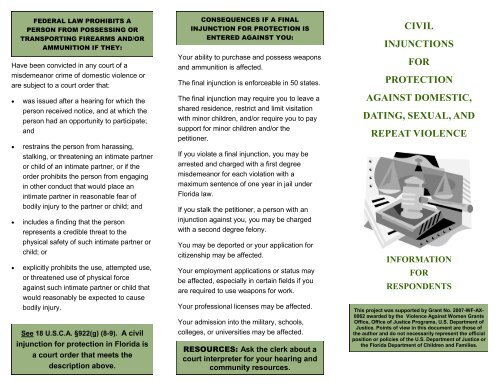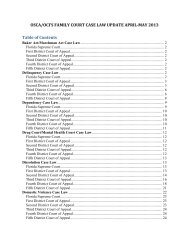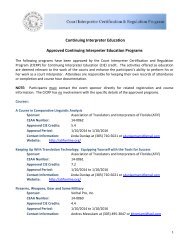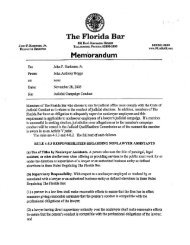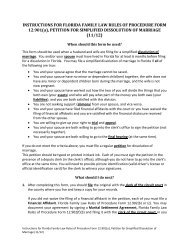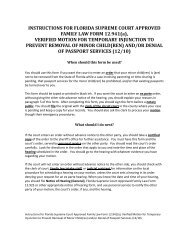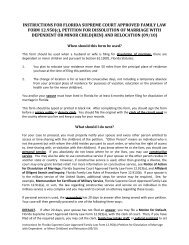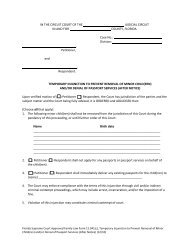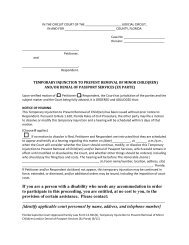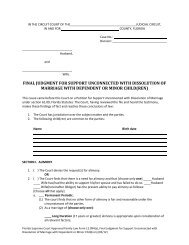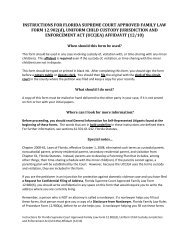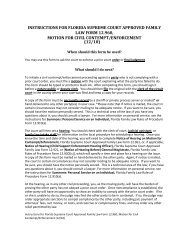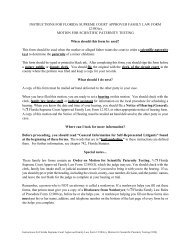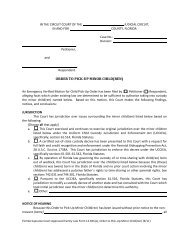civil injunctions for protection against domestic, dating, sexual
civil injunctions for protection against domestic, dating, sexual
civil injunctions for protection against domestic, dating, sexual
You also want an ePaper? Increase the reach of your titles
YUMPU automatically turns print PDFs into web optimized ePapers that Google loves.
FEDERAL LAW PROHIBITS A<br />
PERSON FROM POSSESSING OR<br />
TRANSPORTING FIREARMS AND/OR<br />
AMMUNITION IF THEY:<br />
Have been convicted in any court of a<br />
misdemeanor crime of <strong>domestic</strong> violence or<br />
are subject to a court order that:<br />
was issued after a hearing <strong>for</strong> which the<br />
person received notice, and at which the<br />
person had an opportunity to participate;<br />
and<br />
restrains the person from harassing,<br />
stalking, or threatening an intimate partner<br />
or child of an intimate partner, or if the<br />
order prohibits the person from engaging<br />
in other conduct that would place an<br />
intimate partner in reasonable fear of<br />
bodily injury to the partner or child; and<br />
includes a finding that the person<br />
represents a credible threat to the<br />
physical safety of such intimate partner or<br />
child; or<br />
explicitly prohibits the use, attempted use,<br />
or threatened use of physical <strong>for</strong>ce<br />
<strong>against</strong> such intimate partner or child that<br />
would reasonably be expected to cause<br />
bodily injury.<br />
See 18 U.S.C.A. §922(g) (8-9). A <strong>civil</strong><br />
injunction <strong>for</strong> <strong>protection</strong> in Florida is<br />
a court order that meets the<br />
description above.<br />
CONSEQUENCES IF A FINAL<br />
INJUNCTION FOR PROTECTION IS<br />
ENTERED AGAINST YOU:<br />
Your ability to purchase and possess weapons<br />
and ammunition is affected.<br />
The final injunction is en<strong>for</strong>ceable in 50 states.<br />
The final injunction may require you to leave a<br />
shared residence, restrict and limit visitation<br />
with minor children, and/or require you to pay<br />
support <strong>for</strong> minor children and/or the<br />
petitioner.<br />
If you violate a final injunction, you may be<br />
arrested and charged with a first degree<br />
misdemeanor <strong>for</strong> each violation with a<br />
maximum sentence of one year in jail under<br />
Florida law.<br />
If you stalk the petitioner, a person with an<br />
injunction <strong>against</strong> you, you may be charged<br />
with a second degree felony.<br />
You may be deported or your application <strong>for</strong><br />
citizenship may be affected.<br />
Your employment applications or status may<br />
be affected, especially in certain fields if you<br />
are required to use weapons <strong>for</strong> work.<br />
Your professional licenses may be affected.<br />
Your admission into the military, schools,<br />
colleges, or universities may be affected.<br />
RESOURCES: Ask the clerk about a<br />
court interpreter <strong>for</strong> your hearing and<br />
community resources.<br />
CIVIL<br />
INJUNCTIONS<br />
FOR<br />
PROTECTION<br />
AGAINST DOMESTIC,<br />
DATING, SEXUAL, AND<br />
REPEAT VIOLENCE<br />
INFORMATION<br />
FOR<br />
RESPONDENTS<br />
This project was supported by Grant No. 2007-WF-AX-<br />
0062 awarded by the Violence Against Women Grants<br />
Office, Office of Justice Programs, U.S. Department of<br />
Justice. Points of view in this document are those of<br />
the author and do not necessarily represent the official<br />
position or policies of the U.S. Department of Justice or<br />
the Florida Department of Children and Families.
WHAT IS A TEMPORARY<br />
INJUNCTION?<br />
You were served with a court order called<br />
a temporary injunction. This order is in<br />
effect until your court hearing. It may be<br />
extended by the judge at the hearing.<br />
You are the respondent, and the other<br />
person is the petitioner.<br />
This is a <strong>civil</strong> injunction not a criminal<br />
charge or case.<br />
Please read the court order very carefully<br />
because it tells you what you CAN AND<br />
CANNOT DO be<strong>for</strong>e your hearing.<br />
WHAT DOES THIS MEAN?<br />
The judge has ordered that you:<br />
DO NOT contact the other person in this<br />
case either in person or by phone, emails,<br />
text messages, letters, sending gifts,<br />
talking in public places, sending messages<br />
or having others talk to the other person<br />
<strong>for</strong> you. YOU MAY NOT HAVE CONTACT<br />
EVEN IF THE OTHER PERSON<br />
CONTACTS YOU FIRST!!!<br />
DO NOT go any place prohibited in the<br />
temporary injunction (other person’s home,<br />
place of work, or other places listed in the<br />
order signed by the judge) or within 100<br />
feet of the other person’s car. You may not<br />
have contact EVEN IF YOU ARE<br />
INVITED!!!<br />
ONLY THE JUDGE CAN CHANGE THE<br />
ORDER. The other person cannot decide<br />
to change or dismiss the order alone. If<br />
the other person contacts you, it is not a<br />
crime, but if you have contact with the<br />
other person YOU CAN BE ARRESTED<br />
AND CHARGED WITH A CRIME (up to<br />
one year in jail)!!!!<br />
WHAT ABOUT ME?<br />
You will have a chance to talk to the judge at<br />
the hearing. Attend your hearing. If you<br />
cannot go to court <strong>for</strong> a good reason, contact<br />
the court in writing and ask <strong>for</strong> another court<br />
date. Unless your request is granted, you<br />
must attend court on the date indicated.<br />
The court can enter a temporary order based<br />
on one person’s sworn petition alone, but it<br />
is only in effect <strong>for</strong> a short time. Both people<br />
have the chance to address the court during<br />
the hearing be<strong>for</strong>e a final order can be<br />
entered.<br />
WHAT DO I BRING TO COURT?<br />
Witnesses - Witnesses must come to court<br />
to testify. Letters from witnesses are not<br />
allowed. You may subpoena witnesses, but<br />
there is a fee. You may contact the clerk <strong>for</strong><br />
in<strong>for</strong>mation. Police officers usually require a<br />
subpoena in advance to attend hearings.<br />
Evidence - Pictures, phone records,<br />
messages, etc. that you want the court to<br />
consider.<br />
Proof of Income - If the other person is<br />
asking <strong>for</strong> child support or alimony, you must<br />
bring a financial affidavit or proof of income<br />
such as pay stubs, tax returns, etc.<br />
Documents - Car titles and deeds to home<br />
or other shared property.<br />
Copies of Any Other Court Orders -<br />
involving you and the other person such as<br />
divorce, custody, child support, etc.<br />
WHAT IF I JUST DON’T GO TO<br />
MY HEARING?<br />
The judge can enter a final injunction<br />
without you present at the hearing if you<br />
were served and notified of the hearing.<br />
WHAT ABOUT THE HEARING?<br />
The purpose of the hearing is <strong>for</strong> the judge<br />
to decide whether or not to issue a final<br />
injunction.<br />
If you have a pending criminal case about<br />
the same or related incident, you have the<br />
right not to testify in the <strong>civil</strong> injunction<br />
hearing because anything you say can be<br />
used <strong>against</strong> you in the criminal case.<br />
At the hearing, you can consent (agree to<br />
the injunction), or you can object (disagree<br />
with the injunction being entered <strong>against</strong><br />
you). If you object, a full hearing will be<br />
held. Be<strong>for</strong>e you agree, read the potential<br />
consequences on the back of this brochure.<br />
If you have a full hearing, the judge will listen<br />
to both parties, witnesses, and review the<br />
evidence. At your hearing, you will have a<br />
chance to talk to the judge about what the<br />
other person said you did or alleged in the<br />
petition.<br />
If the final injunction is entered, it is not a<br />
“two-way” order. It restricts the behavior of<br />
the respondent (you) only.<br />
If you feel you have been stalked, harassed,<br />
threatened, a victim of violence or are in<br />
imminent danger of becoming a victim of<br />
violence by the other person, you have the<br />
right to petition the court <strong>for</strong> an injunction<br />
<strong>against</strong> the other person in your case. You<br />
may file a petition in the clerk’s office to<br />
request an injunction.


